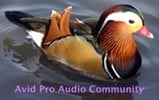
 |
Importing audio files for remix - convert or set session to match source audio?
In PTMP 8, I usually use 24 bit 48 K as my default sessions settings. I have a few songs originally done in Logic 5 on the PC and they are 16 bit, 44.1.
PT will convert these files upon import to my default settings - or, would I be better off just creating a session to match the source files? Is there any benefit or harm with the conversion? It's OK if there's no benefit, as long as it doesn't mess anything up. It's going to be mostly just a remix, but I may want to add new parts which I would rather do at the higher bit and sampling rates. Thanks! |
Re: Importing audio files for remix - convert or set session to match source audio?
Quote:
|
Re: Importing audio files for remix - convert or set session to match source audio?
Thank you MusicMan - that was my gut feeling, it's good to have it confirmed.
I've just been going through my projects I've completed over the last 10 years - not a lot of stuff, but it seems that I did more before I got ProTools, which was at V6 when I converted over. The decreased productivity was not the fault of the software, just life things. Logic 5 was really not a very good program. I think that it would only do 44.1/16 bit, or that was the limitation of whatever interface I was using at the time. But thanks again and Happy Holidays! |
Re: Importing audio files for remix - convert or set session to match source audio?
Ideally you would create an empty 44.1 session at 24 bits and import the files/tracks. The files would go thru no conversion but any processing or new recordings would benefit from the extra bit depth.
|
Re: Importing audio files for remix - convert or set session to match source audio?
Quote:
|
Re: Importing audio files for remix - convert or set session to match source audio?
I only use 24bit/48kHz unless someone pays me extra for 24bit/96kHz.
I've never understood the compromise of 44.1kHz and its upsampled 88.2kHz versions; and had someone asked me, I would have chosen 64kHz as the one and only sampling rate ever available. But that would not have made it possible to enter the bigger-number-is-better game, would it? ;) |
Re: Importing audio files for remix - convert or set session to match source audio?
Quote:
|
Re: Importing audio files for remix - convert or set session to match source audio?
Quote:
|
Re: Importing audio files for remix - convert or set session to match source audio?
My understanding in part of why 44.1 was chosen was so all on some classical piece that the wife of an exec at Sony love(d) would fit on one disk.
Don't know how correct it is but it's a good story |
Re: Importing audio files for remix - convert or set session to match source audio?
That story was put out as PR. The real reason 44x16 was chosen is because it was the highest sample rate and bit depth that could be encoded as a video signal in order to facilitate editing with VTRs rather than mainframe computers. The playing length was determined by the length of a Sony UMatic video tape cartridge. The disk is really a miniature Philips video disk that was designed to be pressed in existing vinyl plants.
The pioneers of digital audio found after extensive research that 50 kHz. and 21 bits is the minimum level of quality that can be considered transparent and the optimum would be around 60 kHz. Lower sample rates involve magical infinite filters that don't exist in real world designs. My experience has been that the damage is already done in the original recording so up-sampling is just adding unnecessary degradation. If I'm starting a recording, I work at 48 or 96 depending on the complexity. If I'm importing audio, I just add 16 bit files to the session but I set the session to 24 bits for recording and 32 float for audio suite signal processing. |
| All times are GMT -7. The time now is 10:13 AM. |
Powered by: vBulletin, Copyright ©2000 - 2008, Jelsoft Enterprises Limited. Forum Hosted By: URLJet.com